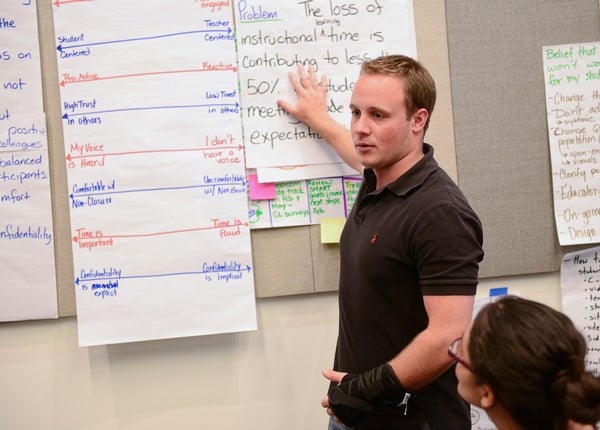|
October 9, 2013
Stanford fellowship offers early-career teachers support and incentive to stay in the classroom
The new Stanford Hollyhock Fellowship program is designed to support talented early-career high school teachers by providing them with world-class opportunities to develop expertise in teaching. By Brooke Donald

The new Stanford Hollyhock Fellowship for Teachers will provide opportunities for early-career teachers to work together and refine their skills. (Photo: Courtesy of CSET)
Nearly half of all teachers leave the classroom within five years. In high poverty schools, the turnover is even higher – leaving the most vulnerable students with the least experienced teachers.
A new fellowship at Stanford's Graduate School of Education aims to help stop this revolving door by encouraging, supporting and recognizing highly motivated early- career teachers and providing them with rich learning opportunities with colleagues nationwide.
The two-year Stanford Hollyhock Fellowship for Teachers will bring 100 high school teachers from low-income schools to Stanford for two weeks of residential summer workshops that include courses taught by university scholars and expert practitioners. Fellows will also receive continuing support during the school year through online coaching and mentorship.
"Teachers often leave the profession just before they hit their stride and have a real mastery of their practice," said Pam Grossman, professor of education and faculty director at the GSE's Center to Support Excellence in Teaching, which designed the fellowship program. "We want to keep talented teachers in the classroom – it's better for students and it's better for schools."
Building more opportunities for teachers to collaborate has been a major effort in school reform, Grossman said. But the way schools are structured works against even the best-laid plans, leaving teachers feeling isolated in their own classrooms and disconnected from a vibrant teacher community.
"Through the fellowship, we can help create a network where teachers feel like they're not in it alone," Grossman said. "We can also give them the intellectual stimulation they crave and provide the resources and facilities of Stanford to help them grow and be inspired. We want to take good teachers and help them become great."
Application deadline
The fellowship is funded through a $4.5 million gift from an anonymous donor. Teachers are awarded a stipend for participation; the program covers all travel and boarding expenses. Application materials will be available in November and applications are due by Jan. 15, 2014. For more information, visit https://cset.stanford.edu/fellowships/hollyhock or email cset@stanford.edu.
The fellowship is aimed at teachers in high-poverty, hard-to-staff schools. A recent Stanford study shows that student achievement is damaged by high teacher turnover and that the effect is particularly strong in schools with more low-performing students, which tend to be in impoverished neighborhoods.
"The nation has been trying for decades to close the achievement gap between better-off and less-well-off Americans, but without clear progress,” said Claude Steele, the GSE's dean. "A top priority of the GSE is to improve how our nation educates its neediest children, and ensuring that they have highly qualified, experienced teachers is vital to that effort."
The Stanford Hollyhock Fellowship will focus on four content areas: science, mathematics, history and English. Fellows will enjoy an immersion experience while on campus. These summer workshops will provide opportunities for teachers to deepen their content knowledge, refine their teaching skills, and develop their leadership potential.
Experts from Stanford will teach the courses, which will take place in the university's world-class labs and classrooms. Participating teachers will receive a certificate of teacher leadership and be eligible for continuing education credits.
To ensure teachers have support at their own schools, the fellowship is designed to encourage teachers to apply with at least one colleague from their schools. It also requires a commitment from the school leadership to the teachers' improvement.
Ongoing support
A main component of the program is to provide teachers with ongoing support throughout the school year. Stanford-affiliated coaches, who will participate in the summer workshops, will provide online mentoring during the academic year. Through an online platform, teachers will be able to share online video of their classrooms and receive feedback from their coach.
Teachers also will be part of a networked online community where they will have the ability to share lesson plans, assignments, video clips and other materials with each other.
When they return from the summer program, teachers will develop their leadership skills by sharing what they've learned with their colleagues. Through its ongoing support and creation of a strong professional community, the Stanford Hollyhock Fellowship program is intended to offer teachers an opportunity for renewal and re-commitment to their jobs.
-30-
|